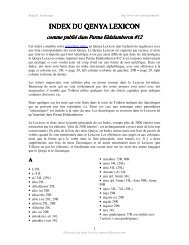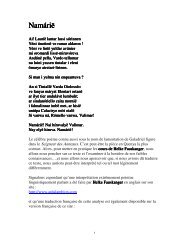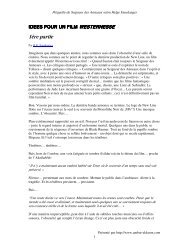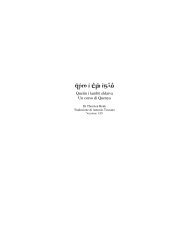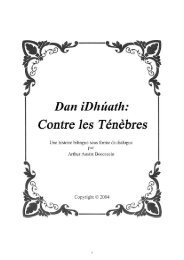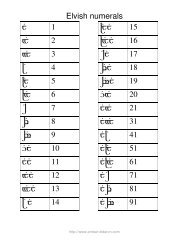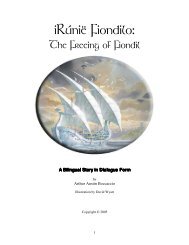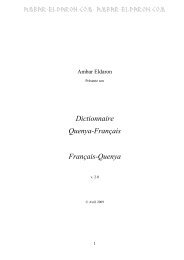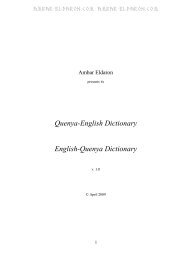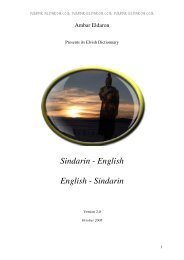Quenya Reverse Wordlist - Ambar Eldaron
Quenya Reverse Wordlist - Ambar Eldaron
Quenya Reverse Wordlist - Ambar Eldaron
Create successful ePaper yourself
Turn your PDF publications into a flip-book with our unique Google optimized e-Paper software.
Helge K. Fauskanger http://www.uib.no/People/hnohf/<br />
odnor rondo "a vaulted or arched roof, as<br />
seen from below" (and usually not visible from<br />
outside); "a (large) hall or chamber so roofed"<br />
(WJ:414; in the Etymologies, stem ROD, the gloss is<br />
simply "cave")<br />
odnorrasaC Casarrondo "Khazad-dûm",<br />
Moria (WJ:388, 389)<br />
odnoy yondo "son" (YÔ/YON); cf. the<br />
patronymic ending -ion. Early "Qenya" has yô, yond-<br />
, yondo "son" (LT2:342). According to LT2:344,<br />
these are poetic words, while yondo is the normal<br />
word for "son" in mature <strong>Quenya</strong>. According to<br />
LT2:344, yondo means "male descendant, usually<br />
(great) grandson", but in mature <strong>Quenya</strong>, yondo<br />
means "son", and the word is so glossed in LT2:342.<br />
odnulu ulundo "monster, deformed and<br />
hideous creature" (ÚLUG)<br />
odnum mundo (1) "bull" (Letters:422)<br />
odnum mundo (2) "snout, nose, cape"<br />
(MBUD)<br />
odnuruaL Laurundo "Glorund" (><br />
Glaurung). Also Undolaurë. (LT2:341)<br />
odnus sundo "base, root, root-word" (SUD),<br />
sc. a Quendian consonantal "base"<br />
odnut tundo "hill, mound" (TUN)<br />
odram mardo "dweller" (LT1:251)<br />
odrom mordo (1) "shadow, obscurity, stain"<br />
(MOR)<br />
odrom mordo (2) "warrior, hero" (LT1:268 -<br />
probably obsoleted by # 1 above)<br />
oel lëo "shade, shadow cast by any object"<br />
(DAY)<br />
oev vëo "man" (WEG; etymologically<br />
connected to vëa "manly, vigorous"; the more neutral<br />
word for "man" is nér.)<br />
ogna ango pl. angwi "snake"<br />
(ANGWA/ANGU)<br />
ognal [lango (2) "throat"] (followed by<br />
*langwi - this evidently indicates that the pl. of lango<br />
is NOT langwi, but rather langor. Contrast ango<br />
"snake", pl. angwi. But whatever the case, lango was<br />
changed to lanco.) (LANG, see LANK)<br />
ognal lango (1) "broad sword", also "prow<br />
of a ship" (LAG)<br />
ognat tango "twang" (TING/TANG)<br />
ognu ungo "cloud, dark shadow" (UÑG)<br />
oh ho "from" (3O); cf. hó-<br />
óh hó- verbal prefix; "away, from, from<br />
among", the point of view being outside the thing,<br />
place, or group in thought (WJ:368)<br />
ohtogñiroM Moriñgotho oldest form of<br />
Moringotto, Morgoth (MR:194)<br />
oio oio "an endless period" (CO) or "ever"<br />
(SA:los). Oiolairë "Ever-summer" (name of a tree,<br />
UT:167; also in the name Coron Oiolairë, "Mound<br />
of Ever-summer", assimilated corol- in the<br />
53<br />
contraction Corollairë) (SA:coron); Oiolossë<br />
"Everwhite, Ever-snowwhite", a name of Taniquetil<br />
(OY), hence the translation "Mount Everwhite" in<br />
Tolkien's rendering of Namárië. See also SA:los.<br />
Explicit "mount" in Oron Oiolossë "Mount<br />
Everwhite" (WJ:403). Ablativic genitive Oiolossëo<br />
"from Mount Everwhite" in Namárië (Nam,<br />
RGEO:67, OY)<br />
oipia aipio "plum tree, cherry tree" (GL:18)<br />
ól ló "night, a night" (DO3/DÔ)<br />
olám málo "friend" (MEL)<br />
olam malo "pollen, yellow powder" (SMAL)<br />
olia ailo "lake, pool" (LT2:339; mature<br />
<strong>Quenya</strong> has ailin)<br />
oll -llo ablative ending, "from" or "out of",<br />
e.g. sindanóriello "out of a grey land", Rómello<br />
"from the East", Mardello *"from Earth" (FS). Pl. -<br />
llon or -llor (in elenillor); dual -lto (Plotz)<br />
ollac callo ("k") "noble man, hero" (KAL)<br />
olle [ello] "call, shout of triumph" (GYEL (<<br />
GEL) )<br />
olley yello "call, shout of triumph" (GYEL)<br />
olleyn nyello "singer" (NYEL)<br />
ollil -lillo or -lillon ending for partitive pl.<br />
ablative (Plotz); see -li<br />
ollo ollo "cliff, seaward precipice" (also oldô<br />
- is this to be understood as the older form?)<br />
(LT1:252)<br />
ollocidnihT Thindicollo (Þindicollo)<br />
original form of Sindicollo, before the shift th > s<br />
(PM:337, there spelt with the special letter Þ, not the<br />
digraph th)<br />
ollocidniS Sindicollo (Þ) "Grey-cloak", title<br />
of Elwë (Elu). Sindarin Thingol. (WJ:410, MR:217).<br />
(Sindi- in this name is a compound form of sindë,<br />
q.v.) Original form Thindicollo (WJ:333). The<br />
Silmarillion appendix (SA:thin(d) ) gives Sindacollo.<br />
ollogniS Singollo (Þ) contraction of<br />
Sindicollo (Silm)<br />
olluc +cullo ("k") "red gold" (KUL)<br />
olóc cólo ("k") "burden" (VT39:10)<br />
oloy yolo- "stink" (GL:41)<br />
oluc [culo, culu ("k") "gold" (substance)]<br />
(KUL; the word culu also occurred in early "Qenya"<br />
[LT1:258], but in the Etymologies it was struck out.<br />
Use malta.)<br />
olús súlo "goblet" (SUG; see SUK)<br />
om -mo ending frequent in names and titles,<br />
sometimes with an agental significance (WJ:400)<br />
omalaC #Calamo pl. Calamor ("k") (Q? -<br />
not Sindarin!) *"Light-Ones" = Light-Elves? (KAL)<br />
omáN Námo (1) "Judge", name of a Vala,<br />
normally called Mandos, properly the place where he<br />
dwells (WJ:402)<br />
Presented by http://www.ambar-eldaron.com



